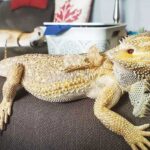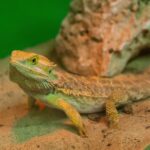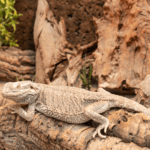Bearded dragons can enjoy a variety of fresh fruits as part of their diet, including some you can find right in your home! However, after you’ve discovered that bearded dragons eat fruit, It’s important to understand how much fruit is too much for these cute little lizards.
Read on to learn which fruits can be part of your beardie’s balanced diet and why!
Absolutely! Bearded dragons can eat fruit (and really enjoy it), but it should only make up a small part of their diet. Too much can lead to obesity and nutritional deficiencies
When feeding fruit to your bearded dragon, remember that smaller pieces are better than large ones, as they can fill up quickly on the sugary foods. Fruits should always be given in moderation, as they are not as nutritionally dense as vegetables and proteins.

A small portion of fruit can be given once every day or two. Fruit is actually not recommended as a part of every meal.
The best way to think about it feeding fruit to your bearded dragon is as a treat — like sweets for a kid. It can be mixed in with their vegetables and proteins, but it should not replace those essential parts of their diet. The nutrients provided by dark, leafy greens and protein-rich insects are critical to a beardie’s health. Missing out on these and relying too heavily on sugary fruits can quickly lead to nutritional deficiencies.
Tip: If you discover that your pet is skipping their leafy greens, you can encourage your beardie to eat their leafy greens by mixing in finely chopped pieces of a healthy fruit.
Just like humans, beardies reap health benefits from a balanced diet. Fruits can provide important antioxidants, essential fatty acids, and other essential nutrients for your pet’s health. A diet void of fruit could lead to nutritional deficiencies.
A vital but tricky nutrient for bearded dragons to get in their diet, calcium supports the development and maintenance of a healthy skeletal system. A lack of readily available calcium can lead to severe problems, including metabolic bone disease, a disease characterized by thin and weak bones.
Many fruits can provide calcium for bearded dragons in a tasty bite. Beardies will eagerly gobble up their portion of fruits (unaware of the nutritional benefits). Fruits high in calcium can be an excellent supplement to your pet’s diet.
Fruits can also provide essential vitamins, such as Vitamin A and Vitamin C. Many fruits can have a beneficial effect on vision and can help boost immunity. Regular, healthy doses of essential vitamins pay off in the long run, protecting your pet’s overall health and wellness and guarding them from disease later in life.

Fruits can be great dietary supplements and can provide necessary vitamins and minerals to your bearded dragon. But it can also do more harm than good if given too frequently or in large portions. There are several reasons fruit should take a supporting role in a beardie’s diet, but never become the main star.
Sugar content
Fruits can be high in sugar, which can cause imbalances in your pet’s blood sugar levels. Too much sugar can result in weight gain, bloating, and can even impact your beardie’s mood and energy levels.
Fruits that are higher on the glycemic index are best avoided or given in very small amounts to prevent a spike in blood sugar. Fruits such as dates, figs, and cherries can have higher glycemic index ratings than other fruits.
Fruits can also be high in water content. While this can be beneficial for beardies who aren’t getting enough hydration, high water content comes at the expense of nutritional density.
If you allow your beardie to fill up on a watery fruit, like watermelon, they won’t have room or appetite for the more nutritious vegetables and proteins they need to thrive.
If you’re concerned about dehydration, the best way to ensure that your bearded dragon is getting the right amount of water is by providing a bowl of fresh, clean drinking water available all day long.
A diet that focuses on fruits can quickly lead to nutritional deficiencies. Fruits can be an important supplement to a beardie’s overall diet, but if they make up more than a small minority of the total daily food intake, your pet is at risk for malnutrition.
Never underestimate the importance of a diet rich in leafy greens and protein-rich insects. Bearded dragons that fall short can experience stunted growth, ill health, and can even develop serious diseases.
It’s important to make sure your adult bearded dragon is fed a diet comprised of 90% leafy greens and 10% insects, along with calcium supplementation and the occasional fruit treat.
Fruits can be a delicious and nutritious treat for your pet, just make sure to practice moderation and never let them become the main focus of their diet!
When it comes to your beardie’s diet, not all fruits are created equal! Some can provide an excellent source of necessary vitamins and minerals, while others can be too high in sugar or water content.
In general, it’s best to stick to fruits that can safely provide nutrients without excessive amounts of sugar or water content.
As we’ve discussed, calcium is key for bearded dragon health and fruits can be a great source of it. However, not all fruits offer a significant amount of calcium. It’s best to avoid calcium-poor options, as they can contribute to a calcium-phosphorus imbalance.
Look out for fruits that have greater amount of phosphorus than calcium and limit how often you feed them to your bearded dragon. Too much phosphorus inhabits the absorption of calcium and can lead to metabolic bone disease and other maladies. If a fruit has a poor ratio of calcium to phosphorus, it should be given only in extreme moderation.

- Apples
- Pears
- Prickly pears
- Green bananas (in moderation, overripe bananas can be too high in sugar)
Fruits can be a tasty and nutritious treat for your bearded dragon, as long as you practice moderation and know what to feed them! Some fruits should only be given in small quantities, others should NEVER be given to a bearded dragon. With the right knowledge, you can confidently feed your beardie the best fruits for their diet.
Fruits that are low in calcium and/or too high in phosphorous aren’t inherently dangerous to your pet, but given too much of these fruits too often can lead to a calcium deficiency and related health issues.
Examples of fruits that are low in calcium and/or high in phosphorus:
- Peaches
- Cherries
- Grapes
- Guava
- Mangoes
- Honeydew
- Bell peppers
Again, are these fruits you should avoid entirely? No, they’re still nutritious and can be great treats if given in moderation. Just make sure they don’t become a staple of your pet’s diet!
Some fruits can be too acidic for a bearded dragon’s delicate digestive system. Eating too much of these can lead to digestive issues and can cause dental problems over time.
Examples of fruits that are too acidic for bearded dragons:
- Oranges
- Lemons
- Kiwi
- Grapefruits
- Pineapples
Acidic fruits are high in citric acid, which can be dangerous for your pet if taken in large quantities and upsetting even in small qualities. It’s best to avoid acidic fruits all together.
Too much sugar can cause serious health problems in a bearded dragon, particularly obesity. Sugar can also lead to poor nutrient absorption, can suppress the immune system of your pet, and weaken their teeth.
Examples of sugary fruits to avoid:
- Dates
- Raisins
- Cherries
- Dried apricots
These sugary fruits offer little to know benefit =to your pet’s diet and can be dangerous if given too often. It’s best to find other fruits to feed your pet.
- Avocados (toxic)
- Rhubarb (toxic)
- Oranges (too acidic)
- Lemons (too acidic)
- Raisins (too sugary)

So, what have we learned? Can bearded dragons eat fruit? Yes, bearded dragons eat fruit and can benefit from the nutrition of their favorite fruit snacks. Finely chopped fruits are easy for your pet to eat and pack a nutritional punch that promotes a happy and healthy beardie.
However, some fruits can be too sugary, acidic, or contain an unhealthy calcium/phosphorus ratio. The best fruits for a bearded dragon diet are apples, pears, prickly pears, and green bananas – eaten in moderation!
Avoid fruits that are toxic, acidic, or too sugary for your pet. Find creative ways to mix and combine the fruits with dark, leafy green vegetables, so your beardie can enjoy a variety of nutrients from their diet!
The next time you’re in the produce section of your favorite grocer, you can confidently pick up some fruits for your pet knowing exactly what to look for! They will surely appreciate the extra treat!

![Can Bearded Dragons Eat Fruit? [Best & Worst Fruits]](https://dragonsdiet.com/cdn/shop/articles/red-3580560_1280.jpg?v=1590464335&width=1100)




:max_bytes(150000):strip_icc()/13-f9fc54bc64854d20b43e00db91a9cb16.jpg)